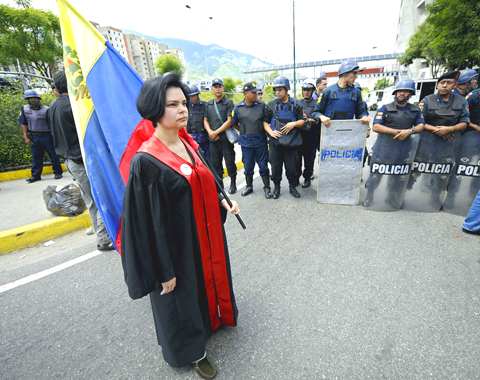Venezuelans may be forced to spy on their neighbors or risk prison terms under Venezuelan President Hugo Chavez’s new intelligence decree, raising fears of a Cuba-style system that could be used to stifle dissent.
Chavez says the intelligence law that he quietly decreed last week will help Venezuela detect and neutralize national security threats, including assassination or coup plots. But many Venezuelans are alarmed they could be forced to act as informants for the authorities — or face up to four years in prison.
“It’s a system just like Cuba,” said Raul Barbiera, an 80-year-old barber who was born in Spain and emigrated decades ago.

PHOTO: AFP
He said the law reminds him of his experiences as a young man during the fascist dictatorship of Spanish General Francisco Franco, when “you couldn’t speak against the government.”
Barbiera said people will watch what they say because “anyone can start a file on you.”
Chavez’s leftist government maintains links to community activist groups and also has set up neighborhood-level “communal councils” that decide how to spend government funds for community projects.
The law says community-based organizations may be called upon to provide intelligence. Critics suspect such groups could become like Cuba’s Committees for the Defense of the Revolution, which often are a forum for neighbors to snoop on each other and report suspicious activities to authorities.
Nancy Silva, a 45-year-old shopkeeper, said she worries about the creation of neighborhood-level spying networks.
“The government wants citizens to spy on each other. That’s scary,” Silva said.
Venezuelan Justice Minister Rodriguez Chacin denied that Venezuela was copying Cuba’s intelligence services.
He said on Monday that all Venezuelans have an obligation to cooperate.
But constitutional law attorney Alberto Arteaga Sanchez noted that Chavez “is constantly calling opposition leaders coup-plotters and pro-imperialists.”
“And that makes me suspect this law may be used as a weapon to silence and intimidate the opposition,” Sanchez said.
Many Venezuelans distrust the intelligence agencies, whose members have been accused over the years of crimes ranging from executions to obstruction of justice.
Chavez has denied the law would infringe on freedoms, saying it falls into “a framework of great respect for human rights” and is necessary to thwart efforts by US spies to gather information on his government.
He says the law would help prevent military rebellions like the 2002 coup that briefly removed him from power.
Rights groups say the law’s surveillance provisions also are a cause for concern.
Security forces do not need court orders for wiretapping and authorities can withhold evidence from defense lawyers if that is deemed to be in the interest of national security.
Venezuela’s new law also revamps the intelligence services, replacing the Disip secret police and Military Intelligence Directorate with four new agencies, two under the Justice Ministry and two under military command.
“Getting the armed forces involved in domestic security tasks are typical of the dark times of military dictatorships,” said Rocio San Miguel, who heads a Venezuelan nongovernmental group that monitors security and defense issues.

Tens of thousands of Filipino Catholics yesterday twirled white cloths and chanted “Viva, viva,” as a centuries-old statue of Jesus Christ was paraded through the streets of Manila in the nation’s biggest annual religious event. The day-long procession began before dawn, with barefoot volunteers pulling the heavy carriage through narrow streets where the devout waited in hopes of touching the icon, believed to hold miraculous powers. Thousands of police were deployed to manage crowds that officials believe could number in the millions by the time the statue reaches its home in central Manila’s Quiapo church around midnight. More than 800 people had sought

DENIAL: Pyongyang said a South Korean drone filmed unspecified areas in a North Korean border town, but Seoul said it did not operate drones on the dates it cited North Korea’s military accused South Korea of flying drones across the border between the nations this week, yesterday warning that the South would face consequences for its “unpardonable hysteria.” Seoul quickly denied the accusation, but the development is likely to further dim prospects for its efforts to restore ties with Pyongyang. North Korean forces used special electronic warfare assets on Sunday to bring down a South Korean drone flying over North Korea’s border town. The drone was equipped with two cameras that filmed unspecified areas, the General Staff of the North Korean People’s Army said in a statement. South Korea infiltrated another drone

COMMUNIST ALIGNMENT: To Lam wants to combine party chief and state presidency roles, with the decision resting on the election of 200 new party delegates next week Communist Party of Vietnam General Secretary To Lam is seeking to combine his party role with the state presidency, officials said, in a move that would align Vietnam’s political structure more closely to China’s, where President Xi Jinping (習近平) heads the party and state. Next week about 1,600 delegates are to gather in Hanoi to commence a week-long communist party congress, held every five years to select new leaders and set policy goals for the single-party state. Lam, 68, bade for both top positions at a party meeting last month, seeking initial party approval ahead of the congress, three people briefed by

Indonesia and Malaysia have become the first countries to block Grok, the artificial intelligence (AI) chatbot developed by Elon Musk’s xAI, after authorities said it was being misused to generate sexually explicit and nonconsensual images. The moves reflect growing global concern over generative AI tools that can produce realistic images, sound and text, while existing safeguards fail to prevent their abuse. The Grok chatbot, which is accessed through Musk’s social media platform X, has been criticized for generating manipulated images, including depictions of women in bikinis or sexually explicit poses, as well as images involving children. Regulators in the two Southeast Asian